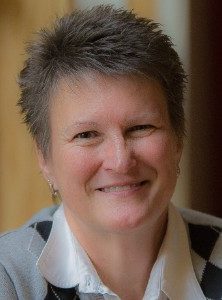Sometimes when I’m watching the news, there’ll be a story about an older woman being mugged or a grandma being held hostage. “A 63-old grandmother was severely injured today,” the newscaster will intone with all the gravity due the harming of a fragile, wilted, declining old woman.
“How,” I inevitably think, “can someone do something like that to a poor, feeble, weak, old woman?”
Then I realize, I’m 63.
I don’t feel 63.

Susan Shaw
My students assure me I don’t act 63, whatever that means to a 20-year-old.
Still, despite any evidence to the contrary, I turned 63 in December, and my thoughts, especially as I approach retirement in two years, have turned more and more to aging.
In fact, I have now reached that stage of life when my friends and I engage in what my friend Janet Lockhart calls “organ recitals” — the litany of our latest aches, pains, illnesses, drugs and doctors’ visits.
Now things like Medicare, 401(B) accounts, falling, funerals, assisted living, estate planning and legacies take up more space in my brain than I could have imagined.
Still, I’m having the time of my life — in fact, the best time of my life. I live in moment-by-moment gratitude and joy for my family, my health, my friends, my career, my home, my travel and all those experiences, big and small, that make up a good, good life.
I know I’m privileged in that way, and if I died tomorrow I’d have no regrets. I’ve even been able to come to terms with the mistakes I’ve made, the harm I’ve done and the harm that’s been done to me. I’ve walked through every open door, and I’ve had a life bigger than I ever could have imagined as a kid growing up in Rome, Ga., in the 1960s and ’70s.
In fact, when I was taking my developmental psychology seminar during my doctoral work at Southern Seminary in the early 1980s at the ripe old age of 23, we studied Erik Erikson’s stages of psychosocial development. Erikson saw the teenage years as a time to develop identity, a strong sense of self. Young adulthood was the time to develop intimacy, the ability to relate deeply to a significant other. Older adulthood was the time for ego integrity — the ability to come to terms with one’s life and look back with no regret.
I remember telling my friends in the seminar, “Well, I’ve failed identity and intimacy, but, by God, I’m gonna pass ego integrity!”
Now here I am. Definitely more worn around the edges, salt and pepper hair, old age spots, deepening laugh lines and extra pounds around the middle that just won’t go away. I’d have horrified me at 23. But at 63, I’m good with me, just as I am.
At 23, full of ambition and uncertainty, a poster girl for imposter syndrome, naïve, self-abnegating, limited by a lack of experience beyond my small Southern Baptist world, uncomfortable in my body, broke and without even a line of credit to my name, I could not have imagined what ego integrity would really feel like.
“I want to go to my grave looking like I’ve lived a life, with all the scars, wrinkles, dark circles under my eyes, and metal body parts needed to keep me going as long as I can.”
This sense of peace with myself and the world, satisfaction with the course of my life, and joy in the most mundane of pleasures like chocolate and ABBA and the weeping maple in our backyard remind me the journey is worthwhile and, however it ends, I wouldn’t have missed it — not that I’m slowing down. I’d say I’m still picking up speed. I tell Catherine, I want to go to my grave looking like I’ve lived a life, with all the scars, wrinkles, dark circles under my eyes, and metal body parts needed to keep me going as long as I can.
So, what would this me say to that me of middle school and high school, the self-conscious, suffering kid who hid herself in books and found self-worth in being the good girl, the girl with Bible brought and lesson prepared, the one who begged forgiveness of the God who saw everything including who I really was in my sinful heart? What would I say to the teenager who learned to dissociate and hide pain behind a veneer of academic success and churchgoing, who feared nothing more than being stuck in Rome for the rest of her life? What would I say to her?
If I could reach back through time and talk to my younger self, I’d tell her:
- “It gets better.”
- “It’s not your fault.”
- “Your 6-year-old soul did not need saving. It was not sinful, and it was not going to hell.”
- “Growing your hair long is a bad idea.”
- “Those feelings you got around a few other girls now and again, those were crushes. You just don’t know that yet.”
- “It’s OK to go to your prom. Dancing is not a sin.”
- “No matter how many times they make you watch ‘A Thief in the Night,’ there’s not going to be a rapture. Some guy in England in the 19th century made it up.”
- “Bellbottoms, mini-skirts, and short shorts — all bad ideas. Please avoid. You will not enjoy looking back at those photos.”
- “Keep scribbling those notes and questions about problematic passages in the margins of your Scofield Reference Bible. They are not doubt nor sin, and you’ll have a way to deal with them soon, just not in your Sunday school class.”
- “You’re not going to believe how well everything’s going to turn out. Sure, there are going to be some seriously rough patches along the way. But you’ll see more of the world than you can imagine and learn how little of the world you know. You’ll make friends, have and lose loves, and find the love of your life on a country-western dance floor. Like I said, you’re not going to believe this.”
- “You’re going to write books, just not those Pulitzer Prize-winning novels you dreamed of penning. You’ll have the best career in the world as a teacher, a college professor, as a matter of fact. You’ll have some profound struggles, but like a new artist down the road named Kelly Clarkson will sing, ‘What doesn’t kill you makes you stronger.’”
I wish my younger self could know how well things are going to turn out for her. I think that might have helped her during those dark nights of the soul.
“I wish my younger self could know how well things are going to turn out for her.”
Of course, I wouldn’t be who I am had she not been who she was, and, while I won’t say everything that happened was God’s will or was essential for my growth or was part of some divine plan, I will say I’m making peace with it all. I’m letting the pain and heartbreak and suffering be just that. It simply was. There’s no explanation for it other than bad things happen. It’s the price of admission to this one glorious life we get.
Undoubtedly, there’s more pain to come. Aging makes that inevitable. Friends die. Knees give out. Cancer steals in uninvited. After all, there’s only one way out of this life, and we’re all headed there, one way or another.
If I make it to 100, however, I hope my 100-year-old self would say to me, “It’s going to be OK. You won’t believe all you’re going to do and learn, the people you’ll love, the joys you’ll experience.”
And she’ll tell me how I hold the heartbreak in tension with the joy and remind myself a breaking heart means there has been love, and love really is every cliché because it is a many-splendored thing that makes the world go ‘round.
Essayist Annie Dillard says that at the end the dying pray not “please,” but “thank you.”
That’s what I’d tell my younger self — that in old age she’ll be able to look back and see a life more filled with love and joy and gratitude than she can imagine. “Life in old age,” I’d tell her, “like Narnia grows bigger as you move further up and further in.”
I wouldn’t offer her any platitudes about the sweet by and by. I think this life is it, but I rejoice in the thought of the very matter that makes up my body returning to the universe to live in dirt and plants and animals and stars.
This is enough to keep me shouting “hallelujah” all my days.
Susan M. Shaw is professor of women, gender and sexuality studies at Oregon State University in Corvallis, Ore. She also is an ordained Baptist minister and holds master’s and doctoral degrees from Southern Baptist Theological Seminary. Her most recent book is Intersectional Theology: An Introductory Guide, co-authored with Grace Ji-Sun Kim.


